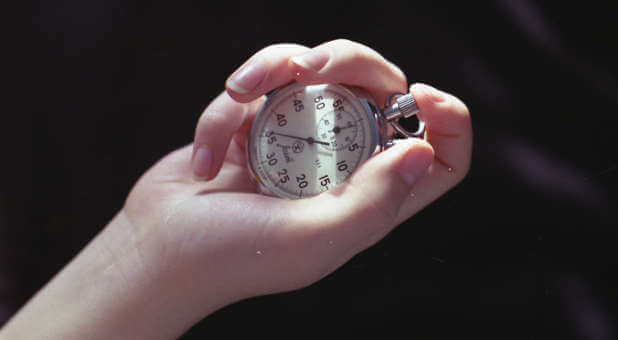Imagine we’re at a graveyard. You look at a tombstone and see the person’s name, the date they were born and when they died.
In between the dates there is a dash. I think it’s interesting that a person’s whole life—from the time they are born until they die—is represented by that dash.
So I want to ask you: What are you doing with your dash?
Time goes by so fast, and you don’t want to get to your later years in life and have nothing but regrets. David talks about this in the Psalms.
Psalm 39:4-5 (AMPC), says, “Lord, make me to know my end and [to appreciate] the measure of my days—what it is; let me know and realize how frail I am [how transient is my stay here]. Behold, You have made my days as [short as] handbreadths, and my lifetime is as nothing in Your sight. Truly every man at his best is merely a breath!”
It’s so important for us to invest our time in the important things of life. Because you don’t want to spend your life climbing the ladder of success only to find out your ladder is leaning against the wrong building when you get to the top!
It starts with a balanced life.
First Peter 5:8 (AMP) says we should “be sober [well balanced and self-disciplined].” This is the key to living with purpose, making your time count. Are you living a balanced life, getting enough sleep, drinking enough water, taking care of yourself so you have the energy you need to do what God is leading you to do?
Are you focused on the important things—your relationship with God, spending time with family and friends? The people in your life are more important than money. I don’t want to spend my whole life storing up material possessions that are already in the process of decay and will someday end up in a junk yard. That’s what happens to all the things we “worship” here. There is nothing wrong with having nice things and enjoying them, but we cannot afford to put them before the really important things.
So I ask you again: What are you doing with your time? Are you investing it or wasting it?
Make wise choices.
Wisdom is doing now what you will be happy with later on. A good example of this happened when I had a hip replacement in 2015. After the surgery, I healed very well and quickly. The doctor said it was because I was in great shape physically before surgery. I was in great shape because I’ve spent lots of time working out, eating properly, getting good sleep consistently and doing other healthy habits. I paid the price, investing my time in ways that bought me strength and helped me to recover successfully.
Here’s another example: I only have six teeth that don’t have crowns on them. This is because when I was growing up, I never went to the dentist unless I had an emergency. My dentist finally said, “If you’re not going to come in for your regular checkups and cleanings, then don’t call us when you have an emergency.”
Because I wouldn’t take the time to go to the dentist on a regular basis and take care of my teeth like I should have, I ended up spending more time getting my teeth repaired later on. It takes a lot of time to get your teeth crowned—and a lot of shots and pain!
The bottom line is if you take a little time to do the right thing to begin with, then you won’t be forced to take a lot of time later on taking care of problems that could have been prevented in the first place.
Avoid the time-wasters.
I’ve discovered eight simple, practical ways you can avoid wasting your time:
1. Stop getting upset about things you can’t do anything about. Be determined to keep your peace in every situation (John 14:27).
2. Don’t complain (Phil. 2:14). It’s useless, changes absolutely nothing, and the more we talk about problems, the bigger they seem to become.
3. Don’t try to “buy” time by getting less sleep. This actually causes you to lose more time the next day because when you’re tired, you make more mistakes than you would if you were properly rested. And every mistake costs time to fix.
4. Stop hurrying. This also causes us to make mistakes and waste time.
5. Enjoy what you have instead of craving and going after things you don’t have (Eccl. 6:9).
6. Don’t live in the past. You can’t go back and do anything over again. Let it go and get on with life (Phil. 3:8-13)!
7. Take time to deal with little problems and you won’t spend more time later dealing with big ones.
8. Identify things that hijack your time and be firm in avoiding them.
We all have room for improvement in our lives. I want to encourage you to make a decision to begin making changes, with God’s help, in the areas you need to grow in.
You’ll have abundant life in Christ (John 10:10) and make your “dash” count as you invest your time in the plan He has for you! {eoa}












